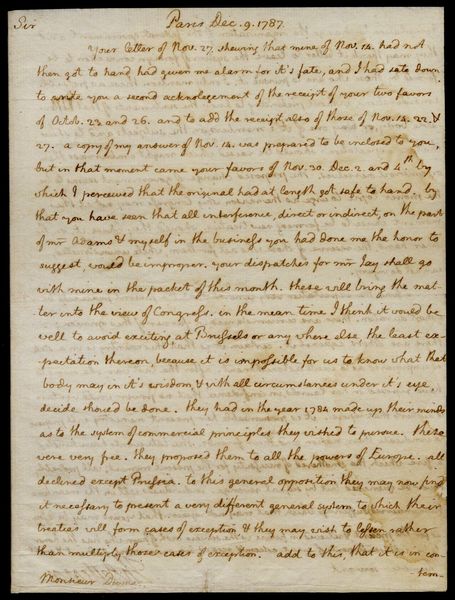Jefferson, Thomas (1743-1826) to M. Duma[s]
High-resolution images are available to schools and libraries via subscription to American History, 1493-1943. Check to see if your school or library already has a subscription. Or click here for more information. You may also order a pdf of the image from us here.
A high-resolution version of this object is available for registered users. LOG IN
Gilder Lehrman Collection #: GLC00322 Author/Creator: Jefferson, Thomas (1743-1826) Place Written: Paris Type: Autograph letter signed Date: 9 December 1787 Pagination: 2 p. : docket ; 23 x 17 cm. Order a Copy
Written as American ambassador to France to Dutchman Charles William Frederic Dumas at the Hague, who had wanted to negotiate a commercial treaty for America. (Dumas had been refused.) Jefferson points out past history and present problems, including the coming change in form of constitution for the U.S. Also mentions his expectation of war in Europe
Notes: Boyd 12: 406-408 from an LC press copy lacking three words in this document and supplied by Boyd in brackets. The Dutchman Dumas had asked permission to negotiate a commercial treaty with the Austrian Netherlands (i.e., modern Belgium) for the United States, but was refused by Secretary for Foreign Affairs John Jay. The American Constitutional Convention deliberations had finished on Sept. 17, 1787. Jefferson alludes to liberalizing in France which led to the recall to power of Jacques Necker in 1788 and the summoning of the States-General in May 1789. General war did not break out in Europe until 1793.
Paris Dec. 9. 1787
Sir
Your letter of Nov. 27. shewing that mine of Nov. 14. had not then got to hand, had given me alarm for it's fate, and I had sate down to write you a second acknolegement of the receipt of your two favors of Octob. 23. and 26. and to add the receipt also of those of Nov. 18. 22. & 27. A copy of my answer of Nov. 14 was prepared to be inclosed to you, but in that moment came your favors of Nov. 30. Dec. 2. and 4th. by which I perceived that the original had at length got safe to hand. By that you have seen that all interference, direct or indirect, on the part of mr. Adams & myself in the business you had done me the honor to suggest, would be improper. Your dispatches for mr. Jay shall go with mine in the packet of this month. These will bring the matter into the view of Congress. In the mean time I think it would be well to avoid exciting, at Brussels or any where else, the least expectation thereon, because it is impossible for us to know what that body may in it's wisdom, & with all circumstances under it's eye, decide should be done. They had in the year 1784, made up their minds as to the system of commercial principles they wished to pursue. These were very free. They proposed them to all the powers of Europe. All declined except Prussia. To this general opposition they may now find it necessary to present a very different general system, to which their treaties will form cases of exception, & they may wish to lessen rather than multiply those cases of exception. Add to this, that it is in [2] contemplation to change the organization of the federal government, and they may think it better to leave the system of foreign connection to be formed by those who are to pursue it. I only mention these as possible considerations, without pretending to know the sentiments of that honourable body, or any one of it's members, on the subject: and to shew that no expectations should be raised which might embarrass them or embroil ourselves. The proposed change of government seems to be the proper topic to urge as the reason why Congress may not at this moment chuse to be forming new treaties. Should they chuse it, on the other hand, the reserve of those who act for them, while uninstructed, cannot do injury.
I find the expectation very general that the present peace will be of short duration. There are circumstances in favour of this opinion; there are others against it. Certain it is that this country is in a state so unprepared as to excite astonishment. After the last war, she seems to have reposed on her laurels, in confidence that no power would venture to disturb that repose. It is presumeable her present ministry will propose to vindicate their nation and their friends. The late events have kindled a fire which, tho smothered of necessity for the present moment, will probably never be quenched but by signal revenge. Individuals will in the meantime have incurred sufferings which that may not repair. That yours may be lessened for the present, & relieved in future is the sincere wish of him who has the honor to be with sentiments of great esteem & regard, Sir, your most obedient & most humble servant
Th: Jefferson
Citation Guidelines for Online Resources
The copyright law of the United States (title 17, United States Code) governs the making of photocopies or other reproductions of copyrighted material. Under certain conditions specified in the law, libraries and archives are authorized to furnish a photocopy or other reproduction. One of these specific conditions is that the photocopy or reproduction is not to be “used for any purpose other than private study, scholarship, or research.” If a user makes a request for, or later uses, a photocopy or reproduction for purposes in excess of “fair use,” that user may be liable for copyright infringement. This institution reserves the right to refuse to accept a copying order if, in its judgment, fulfillment of the order would involve violation of copyright law.
